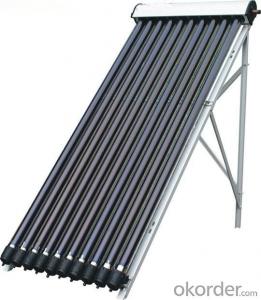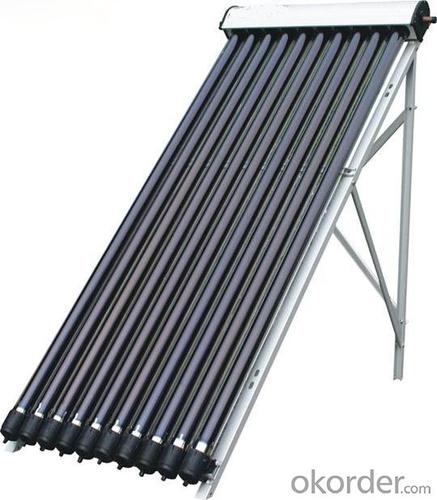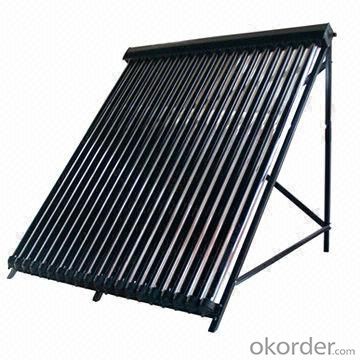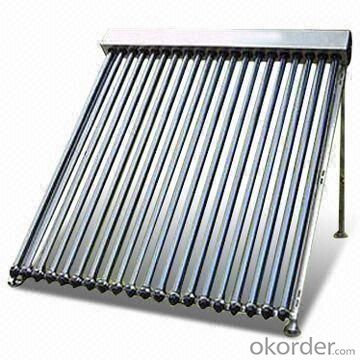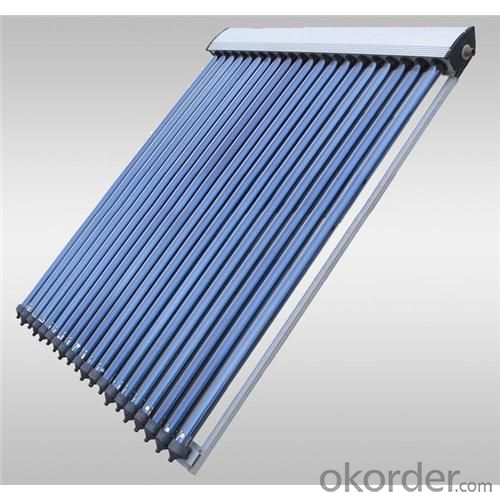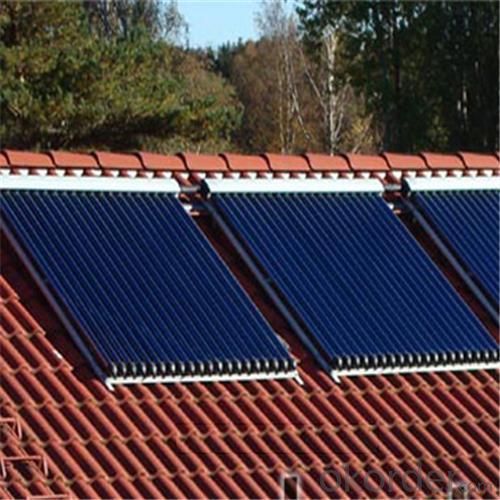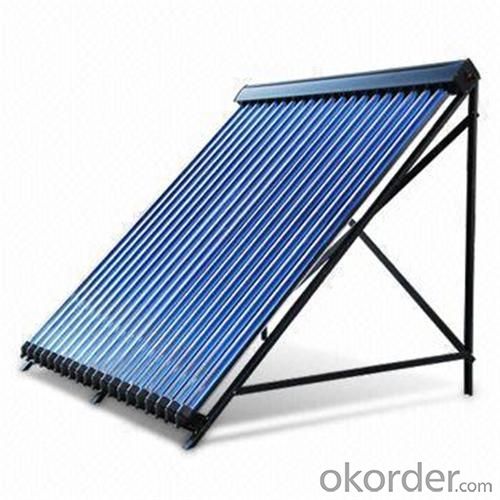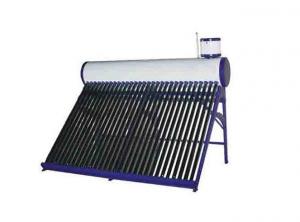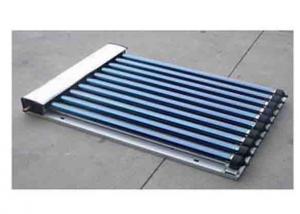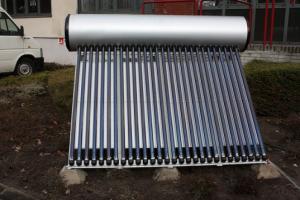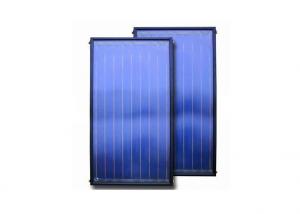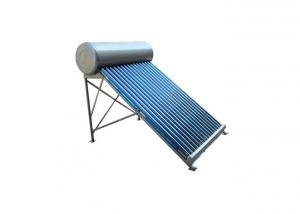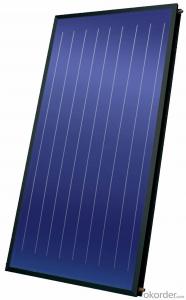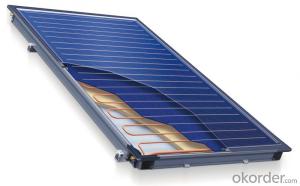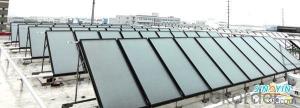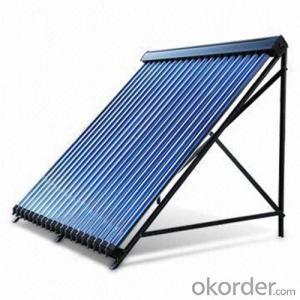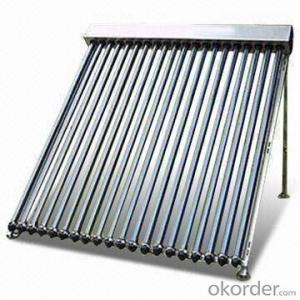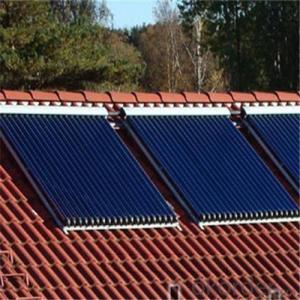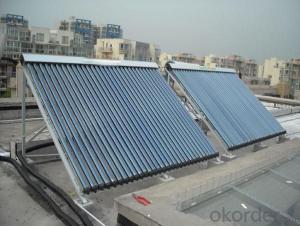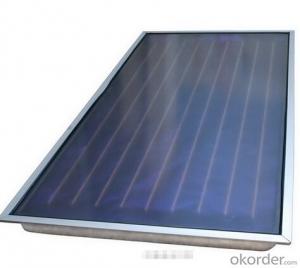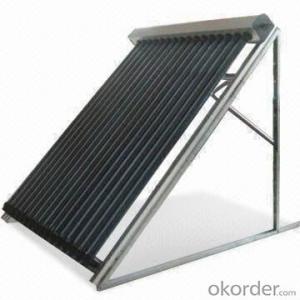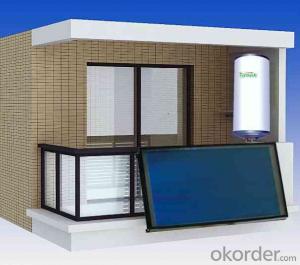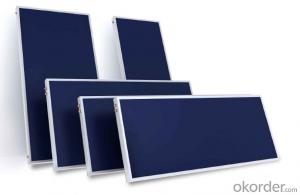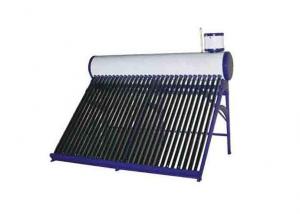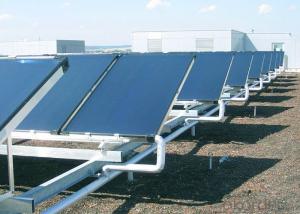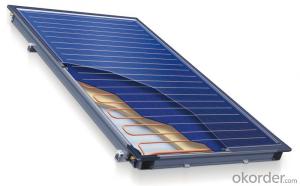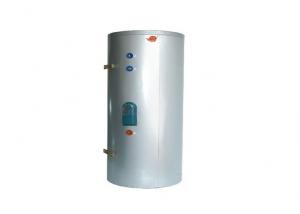Liquid Solar Collectors - Heat Pipes Solar Collectors for Rooftop with ROHS Certificate
- Loading Port:
- China main port
- Payment Terms:
- TT OR LC
- Min Order Qty:
- 5 set
- Supply Capability:
- 10000 set/month
OKorder Service Pledge
OKorder Financial Service
You Might Also Like
Specifications
manifold (inner) | red copper |
manifold (exterior) | aluminum alloy |
glass tube dimensions | 58mm * 1800mm |
daily efficiency | ≥55% |
heat preservation | 72 hours |
hail resistance | 25mm |
max pressure | 7 bar |
coating of vacuum tube | ALN/AIN-SS/CU |
heat pipe | anti-freezing > -35 degree |
certificate | Solar Keymark, EN12975,SRCC |
Serious Product
Models | L*W*H mm | Vacuum tube | Power output | Efficiency | Header mm | Frame | container loading 20FT/40HQ sets | Gross Weight kg |
SHC-8 | 1917*910*133 | 58*1800*8pcs | 939W | 0.668 | Φ35/1.0 | AL alloy | 185/445 | 27 |
SHC-10 | 1917*1130*133 | 58*1800*10pcs | 1189W | 159/385 | 33 | |||
SHC-12 | 1917*1350*133 | 58*1800*12pcs | 1440W | 149/358 | 40 | |||
SHC-15 | 1917*1680*133 | 58*1800*15pcs | 1815W | 120/290 | 49 | |||
SHC-18 | 1917*2010*133 | 58*1800*18pcs | 2191W | 100/242 | 59 | |||
SHC-20 | 1917*2230*133 | 58*1800*20pcs | 2442W | 87/210 | 66 | |||
SHC-22 | 1917*2450*133 | 58*1800*22pcs | 2692W | 83/202 | 72 | |||
SHC-24 | 1917*2670*133 | 58*1800*24pcs | 2943W | 77/188 | 79 |
Packaging & Delivery
Packaging Details: | Exporting Carton with big foaming protection |
Delivery Detail: | In 10-15 days |
Loading Quantity
Model | Tube | Tube Q.T.Y | Loading Q.T.Y/40HQ |
GSC15 | 58*1800mm | 15pcs | 315sets |
GSC18 | 58*1800mm | 18pcs | 265sets |
GSC20 | 58*1800mm | 20pcs | 248sets |
GSC22 | 58*1800mm | 22pcs | 225sets |
GSC25 | 58*1800mm | 25pcs | 200sets |
GSC30 | 58*1800mm | 30pcs | 168sets |
Principle of solar collector:
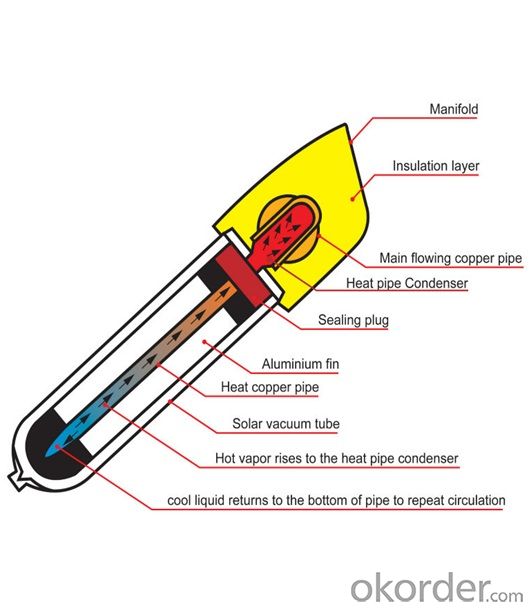
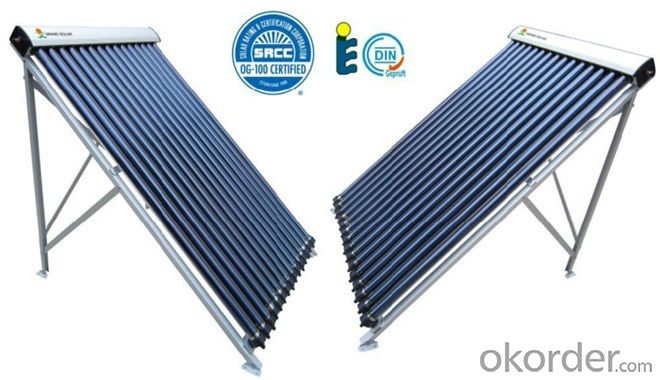
Solar collector details
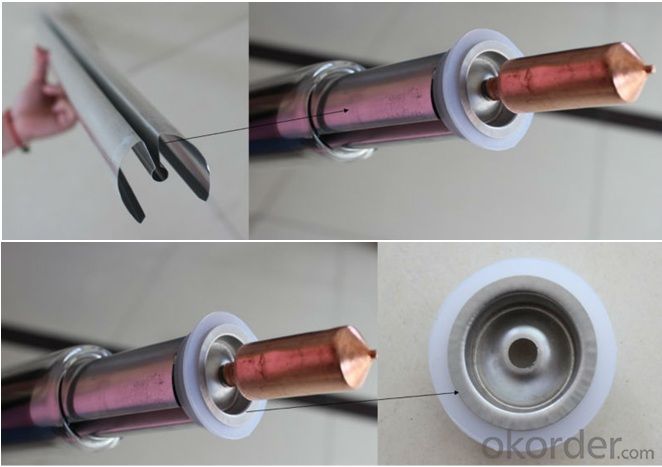
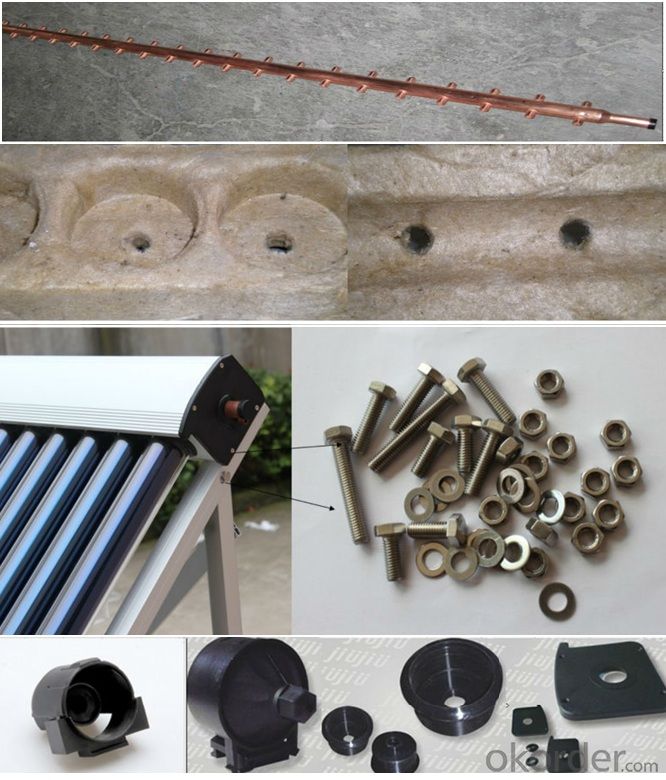
- Q: Can solar collectors be used for heating textile factories?
- Yes, solar collectors can be used for heating textile factories. By harnessing the sun's energy, solar collectors can generate heat that can be used for various industrial processes, including heating textile factories. This renewable and sustainable source of energy can help reduce the reliance on fossil fuels and decrease the carbon footprint of the textile industry.
- Q: Can solar collectors be used in conservation areas?
- Yes, solar collectors can be used in conservation areas. However, their installation and use may be subject to specific guidelines and regulations to ensure minimal impact on the natural environment and aesthetics of the area.
- Q: Can solar collectors be used for heating government buildings?
- Yes, solar collectors can be used for heating government buildings. Solar thermal systems can effectively capture and convert solar energy into heat, which can then be used for space heating and water heating in government buildings. This can help reduce dependence on traditional heating systems, lower energy costs, and contribute to a more sustainable and eco-friendly solution for heating government buildings.
- Q: How do solar collectors affect property value?
- Solar collectors can have a positive impact on property value. Installing solar collectors on a property can increase its attractiveness to potential buyers, as it demonstrates the homeowner's commitment to sustainability and renewable energy. Solar collectors provide a source of clean and renewable energy, which can lead to reduced energy costs for the homeowner. This financial benefit can also be appealing to potential buyers, as it can result in long-term savings on utility bills. Additionally, solar collectors may also qualify for various government incentives and tax credits, which can further enhance the property's value. Overall, the presence of solar collectors on a property can enhance its desirability and marketability, potentially increasing its value.
- Q: Can solar collectors be used for drying gardening tools?
- Drying gardening tools can be achieved by utilizing solar collectors. Solar panels or solar thermal collectors are examples of solar collectors that harness the energy from the sun to produce heat. This heat can effectively dry gardening tools. To dry gardening tools using solar collectors, you have two options. Firstly, you can place the tools in an open area that receives direct sunlight. Alternatively, you can keep the tools inside a greenhouse equipped with solar collectors. These solar collectors absorb sunlight and convert it into heat, warming up the surrounding air to facilitate drying. The use of solar collectors for drying gardening tools offers several benefits. It is an environmentally friendly and cost-effective method since it relies solely on solar energy, eliminating the need for additional energy or fuel and reducing reliance on non-renewable resources. Furthermore, it can lead to long-term energy savings. It is worth noting that the efficiency of solar collectors for drying gardening tools may vary depending on factors like weather conditions, the size of the collectors, and the required drying time. However, with proper planning and utilization, solar collectors can serve as a practical and sustainable solution for drying gardening tools.
- Q: How do solar collectors perform in areas with high pollution levels?
- Despite high pollution levels, solar collectors can still maintain efficient performance, albeit with slight effects. The primary consequence of pollution on solar collectors is the diminished amount of sunlight reaching their surfaces. This is due to the presence of pollutants like smog, dust, and particulate matter in the air, which obstruct and disperse sunlight. The decreased sunlight reaching the collectors can result in a decline in overall energy output. However, advancements in solar technology have facilitated the creation of more productive solar collectors that can generate a substantial amount of energy even in polluted areas. One method of mitigating the effects of high pollution levels on solar collectors is regular cleaning and maintenance. By ensuring that the collectors remain clean and devoid of dust and debris, their performance can be optimized. Additionally, adjusting the orientation and tilt angle of the collectors can maximize sunlight absorption and compensate for the reduced sunlight caused by pollution. It is important to note that the impact of pollution on solar collectors can vary depending on the type and severity of pollution, as well as the specific design and efficiency of the collectors. In certain cases, pollution can have a more significant influence on the performance of solar collectors, particularly if the pollution contains heavy metals or chemicals that can accumulate on the surface of the collectors. Overall, despite the slight reduction in performance caused by high pollution levels, solar collectors remain a viable and sustainable energy source in areas with such conditions. With proper maintenance and efficient design, solar collectors can continue to harness the power of the sun and contribute to renewable energy generation, even in polluted environments.
- Q: Are solar collectors suitable for heating sports facilities?
- Yes, solar collectors are suitable for heating sports facilities. Solar collectors can effectively harness the sun's energy to heat water or air, providing a sustainable and cost-effective heating solution for sports facilities. They can be installed on the roof or in open areas to maximize exposure to sunlight and generate sufficient heat to maintain comfortable temperatures indoors. Additionally, solar collectors can help reduce carbon emissions and contribute to the overall sustainability of sports facilities.
- Q: How do solar collectors perform in areas with frequent power outages?
- Solar collectors can be a reliable source of electricity in areas with frequent power outages. Since solar collectors generate electricity from sunlight, they are not dependent on the grid for power supply. This means that even during power outages, solar collectors can continue generating electricity, providing a consistent source of power. However, it is important to note that the effectiveness of solar collectors during power outages may depend on factors such as the capacity of the system, the availability of sunlight, and the presence of backup storage solutions like batteries.
- Q: Can solar collectors be used in hurricane-prone areas?
- Yes, solar collectors can be used in hurricane-prone areas with proper design and installation considerations. The collectors should be securely mounted to withstand strong winds and potential debris impact. Additionally, regular maintenance and inspection will help ensure their functionality and durability in such challenging weather conditions.
- Q: Can solar collectors be integrated into the design of a building?
- Yes, solar collectors can be integrated into the design of a building.
Send your message to us
Liquid Solar Collectors - Heat Pipes Solar Collectors for Rooftop with ROHS Certificate
- Loading Port:
- China main port
- Payment Terms:
- TT OR LC
- Min Order Qty:
- 5 set
- Supply Capability:
- 10000 set/month
OKorder Service Pledge
OKorder Financial Service
Similar products
Hot products
Hot Searches
Related keywords
